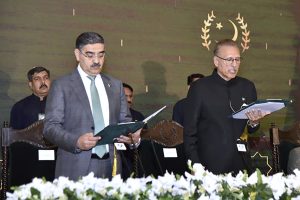The recent appointment of Senator Anwaar-ul-Haq Kakar as the caretaker prime minister of Pakistan has sparked intrigue and interest among political analysts and citizens alike. What makes Kakar’s appointment particularly interesting is not only his relative obscurity on the national political stage but also his background as a little-known politician from Balochistan province.
“We first agreed that whoever should be prime minister, he should be from a smaller province so smaller provinces’ grievances should be addressed,” opposition leader Raja Riaz told the media after a meeting with outgoing Prime Minister Shehbaz Sharif last week.
This surprising decision carries significant implications for Pakistan’s future direction.
In the past, the people in Balochistan have resented the fact that those who are actual leaders from the province are not given a chance to lead their region or have a voice in the capital. Kakar’s appointment as interim premier is a response to that concern. By appointing a person who is not a tribal head (or sardar), is well-respected, and has little political baggage, Pakistan has now indicated a willingness to move toward a more inclusive style of administration.
The state appears to have aspirations for Balochistan and is looking for someone who might be more committed to bringing stability and resurrecting the economy in a region that is seen as a game-changer in current efforts to revive the country’s economy.
The appointment of Kakar as interim prime minister also suggests that Pakistan’s civil-military leadership has chosen to move forward with a person who might be more focused on current challenges rather than engaged in political conflicts over what will happen following the next general elections.
In a statement last month, Sharif pledged to ensure that the caretaker government carried forward the policies of the national interest to achieve consistency. At his first meeting with the heads of various ministries, Kakar stated that the implementation of the economic reforms put forth by the outgoing administration was his top priority. Along with making the efficient functioning of the Special Investment Facilitation Council (SIFC), which is run by the civil-military leadership, his main goal, the interim prime minister also offered his support for the International Monetary Fund (IMF) program.
The military had advised the Sharif government to set up the SIFC for attracting foreign investment from the Gulf countries. The SIFC has already approved a list of 28 projects and also decided to dilute Pakistan and Barrick Gold’s shareholdings in the Balochistan-based Reko Diq project in favor of Saudi Arabia. In a meeting with the Saudi ambassador to Pakistan on Wednesday, Kakar assured him that the SIFC would continue to operate as usual and lay the groundwork for accelerated foreign investment, particularly from Saudi Arabia.
It appears elections in Pakistan may not take place this year, and the caretaker setup will remain in place for a longer period than anticipated. According to the constitution, elections must be held 90 days after the dissolution of the legislature.
However, the interim administration could miss that deadline. After the outgoing government authorized the 2023 census to organize general elections, it appears that the Election Commission of Pakistan (ECP) will need at least 120 days to restructure constituencies before setting a date for polls.
Additionally, the outgoing administration passed several laws that gave the caretaker government the means to exert influence in areas other than elections. This essentially means that with the caretaker government having enough constitutional cover to make policy interventions, there is no urgency for state institutions to push for early elections.
Moreover, the caretaker cabinet consists primarily of professionals and technocrats who are renowned for their successful interventions in their respective disciplines. There are very few politicians in the cabinet. An official told The Diplomat on condition of anonymity that holding fresh elections would simply result in a fiercely divided government where politicians would battle over ministries and portfolios, leaving the issue of governance unattended and causing a setback for the economy. “Maybe this isn’t what Pakistan needs right now, and a caretaker administration with a highly qualified cabinet may last for the foreseeable future,” he added.
It is important to note that the ECP has yet to meet or make a formal announcement about the election date. Additionally, the interim premier has not convened a meeting or issued a statement outlining his intentions to hold elections and maintain transparency.
While it appears that the changeover to the caretaker government has gone well, given that the outgoing administration willingly handed over constitutional powers to intervene in economic policy and other matters, concerns about the elections must be also addressed by the current ruling setup.
For obvious reasons, Pakistan cannot afford to postpone elections for an extended period.
Pakistan will require a new loan from the IMF for a long period to handle its balance of payments crisis and avoid default when the existing nine-month Stand-By Arrangement (SBA) with the institution expires early next year. Whether the interim administration can negotiate a new loan with the Fund is not known.
Pakistan also needs to be concerned about another matter that can affect its exports. Pakistan has benefited from the European Union’s Generalized Scheme of Preferences+ (GSP+) designation since January 2014. The GSP+ enables Pakistan to export goods to the EU at zero import taxes on 66 percent of the EU’s product tariff lines. Pakistan’s GSP+ status is set to expire in December 2023, and the EU is presently debating whether to extend or withdraw it.
A potential perception of political instability amid protracted election delays may harm Pakistan’s standing with the EU and its capacity to bargain with the IMF for a new loan program. The stakes are high as the country searches for a course of action that will benefit the economy and promote stability.

































